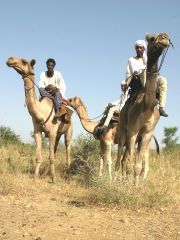Arabs from Chad, Niger pile into Sudan’s Darfur – UN
By Steve Bloomfield
July 14, 2007 (LONDON) — Arabs from Chad and Niger are crossing into Darfur in “unprecedented” numbers, prompting claims that the Sudanese government is trying systematically to repopulate the war- ravaged region, The Independent reported.
 An internal UN report, obtained by The Independent, shows that up to 30,000 Arabs have crossed the border in the past two months. Most arrived with all their belongings and large flocks. They were greeted by Sudanese Arabs who took them to empty villages cleared by government and janjaweed forces.
An internal UN report, obtained by The Independent, shows that up to 30,000 Arabs have crossed the border in the past two months. Most arrived with all their belongings and large flocks. They were greeted by Sudanese Arabs who took them to empty villages cleared by government and janjaweed forces.
One UN official said the process “appeared to have been well planned”. The official continued: “This movement is very large. We have not seen such numbers come into west Darfur before.”
The UN refugee agency, UNHCR, sent a team to the border with Chad at the end of May to interview the new arrivals. Fighting in eastern Chad has been steadily increasing and it was thought that many could be refugees. But only a very small number have required support from UNHCR.
“Most have been relocated by Sudanese Arabs to former villages of IDPs (internally displaced people) and more or less invited to stay there,” said the UN official.
The arrivals have been issued with official Sudanese identity cards and awarded citizenship, and analysts say that by encouraging Arabs from Chad, Niger and other parts of Sudan to move to Darfur the Sudanese government is making it “virtually impossible” for displaced people to return home.
James Smith, chief executive of the Aegis Trust, said the revelations proved that the Sudanese government was “cynically trying to change the demographics of the whole region”, adding: “If the ethnic cleansing has been consolidated because the land has been repopulated it will become irreversible. The peace process will fall to pieces.”
Repopulation has also been happening in south Darfur where Arabs from elsewhere in Sudan have been allowed to move into villages that were once home to local tribes. Aid agency workers said the Arabs were presented as “returning IDPs”.
Before the conflict started in 2003, Darfur was home to seven million people, mainly from three African tribes, Fur, Marsalit and Zargahwa. Darfur literally translates as “Land of the Fur”. But some 2.5 million have now been forced to flee their homes after attacks by Sudanese troops and planes, and Arab militia on horseback known as janjaweed.
Most are now in camps around Darfur’s main towns, relying on handouts from international aid agencies. About 250,000 have become refugees in Chad. A further 1.5 million have been affected by the conflict, meaning at least four million people are now reliant on the 80 or so international aid agencies in the region. More than 200,000 people are believed to have been killed so far during the four-and-a-half-year conflict.
And if Khartoum is moving Arabs from abroad to replace them, diplomats fear that Darfur rebels may try to remove them forcibly. “It could be quite explosive,” said one western diplomat. “It is a very serious situation.”
Nomadic Arab tribes have been crossing the border between Chad and Sudan for centuries, long before lines were drawn on a map. It is normal for tribes to follow the rains from west to east and back again, searching for fertile grazing land for their cattle. Straight lines carve out the northern borders of the five countries which spread across the Sahel, taking no notice of traditional tribal links and nomadic routes.
In Mauritania and Sudan, both countries long ruled by Arabs, black African tribes have suffered most. In Mali, Niger and Chad, the Arab and Tuareg nomads have been suppressed.
Towards the end of last year, Niger announced that it planned forcibly to remove more than 150,000 Arab nomads into Chad. Many of the Arabs, known as Mahamid, moved from Chad in the 1970s after a serious drought. Although the government later rescinded the order, it is thought that many decided to return to Chad voluntarily.
Apart from the 30,000 Arabs from Chad and Niger cited in the UNHCR report there have been consistent rumours that a further 45,000 Arabs from Niger have also crossed over. For most nomads citizenship means very little; the lines that separate the countries of the Sahel have not created a sense of nationality. But for the Khartoum regime it could be pivotal. Elections are to be held in two years, the first since President Omar al-Bashir seized power in a coup in 1989.
Although opinion polling is not very advanced, it is thought that no party is likely to win an overall majority. By providing citizenship for the new arrivals, one Khartoum-based diplomat said, President Bashir could be hoping to bolster his election chances.
For the Arabs who have crossed into Darfur there are both push and pull factors. Drought in parts of northern Africa has forced nomads to look further afield for fertile land. Although the spread of desert is rapidly reducing the amount of land available for farmers and nomads in Darfur, much of the area cleared by the janjaweed and government forces is fertile.
(The Independent)
